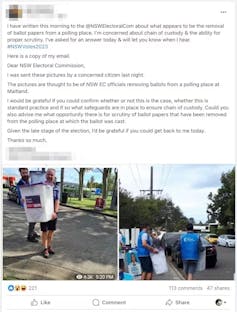
Australians now use social media more often than any other type of media, including TV, radio and websites. While the increased use of social media platforms present new opportunities to access and engage with information, it also introduces serious challenges associated with the spread of misinformation.
The sheer volume of information available on social media is overwhelming. These platforms can be used to target people with false, manipulative and misleading claims.
It’s not surprising most adults regularly encounter false and misleading information when they are online. And those who use social media see misinformation the most.
Although people are concerned about misinformation, our new report reveals that 97% of adults in Australia have limited skills to verify information online.
Concerning findings
Our study tested the ability of 2,115 adult Australians to verify information online. Our sample was representative of the Australian adult population.
Participants were shown two real-life web pages and two social media posts. They were asked to evaluate each of them and decide whether the content is reliable and trustworthy. They were also instructed to explain the steps they took to reach the decision.
To evaluate the content, participants could search online on use any device they had at hand.
In all four tasks, respondents were first asked if the claims on the social media posts or websites were true. These questions had a correct answer.

After the first question, participants were asked to explain how they reached their conclusion. If the respondent provided some evidence as to how they were able to verify the information, they were given one point. If the person clearly articulated how they conducted the verification task and provided sufficient evidence, they were given two points.
The highest score achievable was eight points. We grouped respondents into three categories based on their scores:
- no ability (a score of zero)
- emerging ability (one to three points)
- developing ability (four or more points)
The results raise serious concerns about the ability of Australians to identify misinformation online. Almost half (45%) of adult Australians showed “no ability” to take basic steps to verify online information, and 52% had only an “emerging ability”.
Only 3% of respondents were ranked with a “developing ability” because they scored four or more points.
A large gap between assumption and reality
Most studies about media literacy are based on people’s self-reports – what they say they can do. Prior to this research, very little was known about adult Australians’ actual ability to identify misinformation online.
Our study reveals a large gap between what people say they can do and their actual ability.
In our previous survey, 42% of adult Australians said they were confident they could check if information found online is true.
However, in our new study involving the same respondents, 39% of those who said they were confident didn’t demonstrate any ability to verify information, and 55% had only basic skills. This shows many people overestimate their ability.
Another important finding from the current study: the ability to verify information online is low across the board, across all age groups.
There wasn’t a huge difference between age groups – overall, the vast majority of Australians were struggling to verify information. That said, older Australians tended to score slightly lower. A little more than half of the 60–69 age group landed in the “no ability” category, compared to 38% of those aged 30–39 years.
We did find that news and information consumption habits are related to people’s ability to verify information. Heavy news consumers scored higher. Only 36% of heavy news consumers were in the “no ability” group, compared to 59% of those who are non-news consumers.
This indicates that regularly accessing quality information verified by professional journalists may help people distinguish fact-based and fact-checked stories from other information.
What stands in the way of better verification skills?
We found common challenges that may prevent people from making informed judgements about dubious information.
One unhelpful behaviour was to rely on existing beliefs to decide if content is true, rather than scrutinise the claims made in the post.
Another type of unhelpful strategy is to make a snap judgement about veracity based on a person’s past experience with a content producer or actor featured in the post.
We also found many people accept content at face value, mostly based on their “gut feeling” or emotional response, rather than questioning the content.
These unhelpful strategies prevented people from engaging in lateral reading to verify sources and information. Rather than staying on the website, lateral reading is when you leave the page to check other sources to assess the credibility of the original site.
How do we improve Australians’ ability to verify online content?
Accessing reliable and trustworthy information enables citizens to make informed decisions about everything – from voting, to making purchases, to staying safe online, to accessing health advice and services.
Australians must urgently update their media literacy skills to suit the online environment. However, unlike many advanced democracies such as the Netherlands or Finland, Australia doesn’t have a national media literacy policy or strategy to ensure citizens are provided with support to help them verify information online.
The good news is Australians do want access to media literacy support. In our study, 82% of participants agreed adults need access to media literacy education.
They want this education to be delivered in a range of ways – via online tutorials, short videos and in libraries.
The federal government just failed to get a misinformation bill through the Senate, and some argue legislation may be ineffective even it if is passed.
Our work shows that without equipping citizens with media literacy, legislation can only have limited impact. Misinformation will remain part of our media diet: we all need to develop our ability to be able to identify and respond to it.
![]()
Sora Park receives funding from the Australian Research Council, Creative Australia, SBS and Boundless Earth.
Tanya Notley is a member of the Australian Media Literacy Alliance. She has a current grant from the Australian Research Council.









